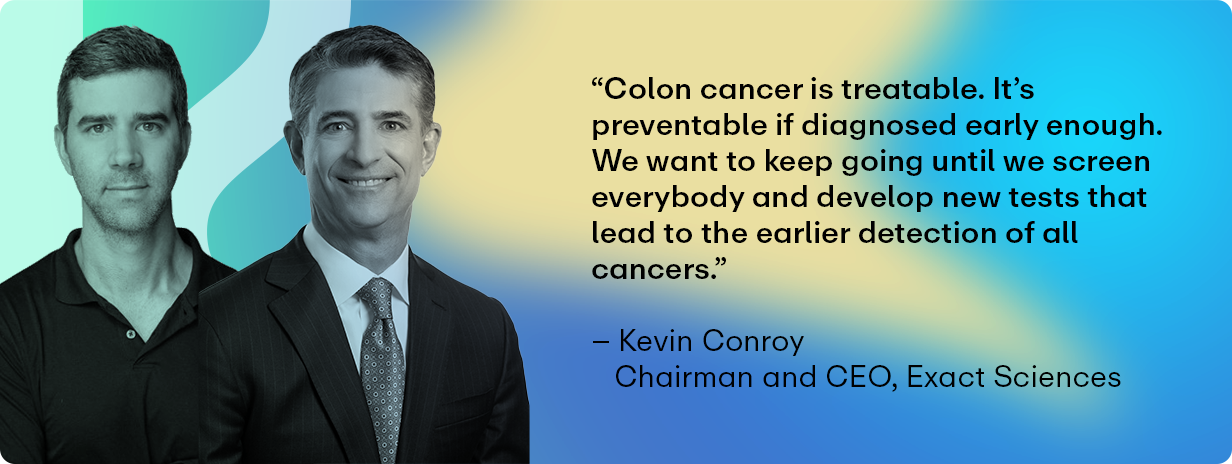Exact Sciences chairman and CEO Kevin Conroy grew up in Flint, Michigan, with a tight group of friends. After he joined the company 15 years ago, four of those friends were diagnosed with colon cancer. Today, only one is still alive.
So the quest toward earlier and easier detection of cancer is clearly personal for Conroy. In this conversation with Kinara co-editor Chase Feiger, the longtime Exact leader discusses the challenges that came with developing the revolutionary Cologuard test, as well as the broader role he hopes to see his company play in the fight to eradicate cancer.
(This Q&A has been edited for length and clarity. To listen to the full Kinara podcast with Kevin Conroy, click here.)
Chase Feiger: You have a personal connection to the impact that colorectal cancer can have on families. How has that influenced the development of Cologuard and Exact Sciences?
Kevin Conroy: My friend Rob died of colon cancer three years ago and left behind three incredible children and a wonderful wife, all obviously heartbroken. And he was diagnosed right before they changed the guideline to recommending screening at age 45. If the guideline had been different earlier and he had been screened, most likely Rob would still be with us and making people laugh and living a fruitful life.
We can’t allow that to happen. This disease is treatable. It’s preventable if diagnosed early enough. We want to keep going until we screen everybody and develop new tests that lead to the earlier detection of all cancers. This is a 100-year goal that we have. We’re not going to stop. We want to build a company that’s able to stand the test of time.
Feiger: There have been 16 million completed screenings with Cologuard in the last 10 years, which have detected 525,000 people with advanced precancerous lesions. Tell me the unique origin story of Cologuard.
Conroy: Chase, you probably had a meeting in your life which you left thinking, “Everything is going to be different.” For me, that meeting was in early March 2009 with Dr. David Ahlquist at the Mayo Clinic, who made the case for two things. The first was that technology would allow us to detect colon cancer accurately from a stool sample, making it easy, accurate and patient-friendly to screen individuals for colon cancer. The second part of that meeting was about the potential to screen a person for many if not all types of cancer from a single blood draw. Those were the two ideas that left me thinking, “Maybe I should become part of this effort to change the way screening is done.” The goal was taking it from something complicated to something easy and effective.
That was 15 years ago. Five years after that, Cologuard was born. It was FDA-approved and approved for Medicare coverage on the same day, the first time that ever happened for a device or a diagnostic. Since then, 16 million people have been screened with Cologuard and many people are now using to screen every three years, as recommended by physician guideline groups.
It’s changing the world. The Centers for Disease Control and Prevention recently put out data that showed a significant jump over the last seven years in terms of people up to date with screening. It has gone from just over 60 percent to over 70 percent – and this is population-wide. It makes us feel great about the future of not only colon cancer screening, but all different types of cancer.
Feiger: With the introduction of a product as novel as Cologuard, there are always challenges you have to deal with along the way. What were they?
Conroy: The first was building a team and company capable of solving this problem – recruiting the very best scientists in the world, like our emeritus chief science officer Graham Lidgard, who moved to Madison, Wisconsin, from La Jolla, California, to solve this problem. Some of the key technical problems were developing a test that was accurate and was able to detect both early-stage cancers and precancerous polyps. Nobody had ever been able to do that from a stool sample before.
We also needed to develop clinical trials that would establish, without question, how accurate Cologuard was. We ran what was the biggest clinical trial at that time: 10,000 patients. Then we needed to secure FDA approval and Medicare coverage, and get the test adopted by hundreds of thousands of physicians, nurses and physician assistants, and educate patients directly through direct-to-consumer education efforts. It was just one challenge after another after another.
Feiger: How is Exact Sciences bridging the screening gap for the 60 million Americans who are not up to date on their colorectal cancer screening?
Conroy: Number one, through patient education. We’re educating people via digital communication, on television and through their healthcare providers. Another piece is making Cologuard super-accessible so that patients can hit the “easy” button: If they want to go online for access to a Cologuard test, they can do that at cologuard.com. Then, finally, we need to get the large healthcare systems that are responsible for about 70 percent of primary care wellness visits and patient engagements to change the way they think about colon cancer screening. We’re doing that through partnerships with those systems. The goal is to connect them with our digital ecosystem so they can order a Cologuard test easily, get a result easily and get the bill submitted to the insurance company and paid easily.
Feiger: How will AI play a role in creating greater efficiencies for your team and for your organization at large?
Conroy: Artificial intelligence is impacting everything that we do at Exact Sciences. It’s impacting how quickly we’re able to answer questions our customers have, whether physicians or patients. AI also has an impact on our people who go into the field every day talking to physicians and nurses because it can help them understand what their flow is during the day and who they should be reaching out to.
We see a world where AI is going to impact the development of every new diagnostic that we bring to physicians and patients. It’s able to look at and consume massive amounts of data and information, and help us see patterns that a human being can’t see. So we’re really excited about how artificial intelligence is going to contribute to our vision of helping to eradicate cancer.
Feiger: What do the next 10 years look like for you and Exact Sciences?
Conroy: I wake up every morning thinking about this. I’ve been here for 15 years, which means I’ve seen Exact Sciences as an infant, as a toddler, as a preteen, as a teenager and now becoming an adult. So I’d go right back to the vision we have of helping to eradicate cancer by detecting it earlier and guiding treatment accurately.
Over the next 10 years there will be an explosion of innovation. Where we have two main tests today, in 10 years there will be 10 new tests that will become standards of care, whether in liver cancer, pancreatic cancer, esophageal cancer or endometrial cancer. This will further revolutionize how we’re detecting cancer and treating it.
One of our biggest goals is to make sure that we make Cologuard and our multi-cancer screening test OncoDetect available for all. We want to make it inevitable that we detect cancer earlier, inevitable that we’re able to help every patient diagnosed with cancer get the right treatment. That’s built into our DNA.
Feiger: There are millions of people who still haven’t taken advantage of the latest diagnostic tools on the market. What message would you send to them?
Conroy: What I would say to the 60 million people who are not up to date with screening is to get screened. Talk to your physician. Ask about Cologuard or colonoscopy. From our perspective, those are the two high-quality approaches to screening, because they reliably detect even early-stage cancers and precancerous polyps.
The tools are there. Don’t wait until the disease has turned into stage three or four cancer.




